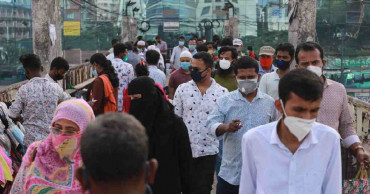Delta variant of Covid
Delta concerns: Philippines extends travel ban for Bangladesh, 9 other countries
The Philippines has extended a ban on travellers from Bangladesh and nine other countries to August 31 because of concerns posed by the highly contagious Delta variant of the Covid-19, presidential spokesperson Harry Roque said Friday.
Aside from India where the Delta variant was first detected, the Philippines also banned travellers from Malaysia, Thailand, Indonesia, Pakistan, Nepal, Sri Lanka, Oman, and the UAE, where the variant has spread.
However, the country will allow returning overseas Filipino workers under its repatriation programme, but they will be isolated for 14 days upon their arrival.
Read: Bangladesh reports 197 new deaths as it fails to take hold on Covid
The Philippines is grappling with soaring Covid-19 infections fueled by the highly transmissible Delta variant, prompting the government to reimpose a hard lockdown in Metro Manila and other regions.
The Philippines now has more than 1.7 million confirmed Covid-19 cases and 29,539 deaths.
The travel ban, first issued on April 27, was later expanded to include Pakistan, Nepal, Bangladesh, Sri Lanka, Oman, and the UAE.
On July 16, the country added Indonesia to the list, followed by Malaysia and Thailand on July 25. The ban was set to expire on Sunday, but the government extended it until August 31.
4 years ago
Bangladesh in grip of Covid’s wave; sees record 212 deaths
Bangladesh on Friday saw 212 Covid-19 deaths, the highest number since the pandemic hit the country, amid a strict nationwide lockdown in effect since July 1.
Also, Covid-19 infections in the country are at their peak now, with 9,665 new cases reported each day – the highest daily average.
The country recorded 11,324 infections in 24 hours till Friday morning after testing 36,850 samples.
Bangladesh reported its highest daily Covid-19 fatality of 201 on Wednesday and 11, 651 cases on Thursday.
The country is in the grip of a second wave of the coronavirus that is threatening to overwhelm its health service.
Also read: Dhaka reemerging as Covid hotspot as battle plan ‘fails’: Experts
There have been 1,000,543 infections and 16,004 coronavirus-related deaths in Bangladesh since the pandemic began, according to the Directorate General of Health Services.
However, the test positivity rate dropped to 14.49%. The daily positivity rate of 31.62% on Thursday raised concerns among experts as the World Health Organization recommended a 5% or below rate.
Meanwhile, the death rate remains unchanged at 1.60%, and the recovery rate dropped to 86.19%.
Khulna division reported the highest 79 deaths, Dhaka 53, Chattogram 26, Rajshahi 23, Rangpur 12, Mymensingh eight, Sylhet six and Barishal five.
Also read: Global Covid cases top 185 million
Hospitals are now overwhelmed with patients and struggling to cope as the country is experiencing a devastating second wave of Covid infections, driven by the Delta variant.
The Prime Minister's Office on Thursday directed the authorities concerned to increase oxygen supply and corona beds in hospitals across the country to ensure the treatment of Covid-19 patients.
So far, Bangladesh has administered at least 10,114,578 doses of Covid vaccines – enough to have vaccinated around 3.1% of the country's population, assuming every person needs two doses.
4 years ago
'Dangerous period' with delta variant: WHO
The head of the World Health Organization says the world is in “a very dangerous period” of the COVID-19 pandemic, noting the more contagious delta variant is identified in nearly 100 countries.
At a press briefing on Friday, Tedros Adhanom Ghebreyesus said the delta variant, first found in India, is continuing to evolve and mutate, and it is becoming the predominant COVID-19 virus in many countries.
Also read: Delta variant exploits low vaccine rates, easing of rules
“I have already urged leaders across the world to ensure that by this time next year, 70% of all people in every country are vaccinated,” he said, adding that would effectively end the acute phase of the pandemic.
He noted 3 billion doses of vaccine have already been distributed and, “it’s within the collective power of a few countries to step up and ensure that vaccines are shared.”
Also read: What should I know about the delta variant?
Of the vaccine doses given globally, fewer than 2% have been in poorer countries. Although rich countries including Britain, the U.S., France and Canada have pledged to donate 1 billion COVID-19 vaccines, WHO estimates 11 billion doses are needed to immunize the world.
4 years ago
Nationwide lockdown from Monday, 'all out lockdown’ from July 1
The government will enforce an all out lockdown from July 1 as the country grapples with a surge in coronavirus cases and fatalities with the highly infectious Delta variant playing havoc.
Meanwhile, the country will go into the earlier announced strict lockdown ‘on a limited scale’ from Monday.
The decision was taken at a high-level meeting, chaired by Home Minister Asaduzzaman Khan Kamal in the chair on Saturday evening.
State Minister for Public Administration Farhad Hossain confirmed the development to UNB.
“Nationwide lockdown will begin on Monday. However, for zonal closing of bills of the banking sector and various government offices at the end of the month, the maximum restrictions will kick in from July 1," he said.
Details on the lockdown will be known after the government issues a notification on Sunday, the minister added.
However, public transport will be suspended from Monday according to sources attending the meeting.
Alsor read: COVID-19: Daily caseload drops on back of reduced tests, as positivity keeps rising
Export-oriented factories are likely to be exempted from the restrictions, they said.
Earlier on Saturday, sources within Bangladesh Garment Exporters and Manufacturers Association (BGMEA) confirmed the news to UNB citing a circular issued by the organisation.
4 years ago
Strict nationwide lockdown in Bangladesh from Monday as Covid situation worsens
The government is going to enforce a new nationwide "strict lockdown" on Monday, as the country grapples with a surge in coronavirus cases and fatalities with the highly infectious Delta variant playing havoc.
The restrictions will remain in place for seven days, said Press Information Department Principal Information Officer Surath Kumar Sarker.
Government and private offices, barring those of emergency services, will remain shut during this period.
All modes of transport, except those carrying emergency goods, will also remain suspended and nobody will be allowed to go out unless there is an emergency.
Also read: From bad to worse: Bangladesh reports 108 new Covid deaths, 5,869 cases
However, the restrictions will not apply to the media, ambulances, and vehicles used for medical purposes.
The Cabinet Division will come up with details regarding the "strict lockdown" on Saturday, Surath said.
The repeated lockdowns have become a threat to the livelihoods of many in Bangladesh while disrupting travel and social lives.
However, experts hope that stricter rules will bring positivity rates and fatalities down as the country is battling to get a second coronavirus wave under control.
Also read: Bangladesh may see dreadful Covid peak ahead of Eid, experts warn
The National Technical Advisory Committee on Covid-19 pandemic on Thursday recommended imposing a "nationwide shutdown" for two weeks considering the worsening Covid-19 situation in the country.
Community transmission of the highly transmissible Delta variant of coronavirus might be the reason behind the current Covid-19 situation in the country, said the committee.
It used the example of India to emphasise that no step other than a "complete shutdown" might be enough to prevent the spread of the Delta variant.
Bangladesh has seen a spike in coronavirus infections and fatalities in recent weeks, with the country reporting its second-highest fatalities – 108 new deaths – and 5,869 cases Friday. It has now seen 878,804 cases and 13,976 deaths.
4 years ago
Bangladesh ill-equipped to cope with Delta variant of Covid: Experts
As the highly contagious Delta variant of Covid-19 has made its way into Dhaka and other districts from frontier ones, experts fear an impending health catastrophe in the coming weeks since there is no strict measure in place to stop it.
They said half-hearted preventive measures, lack of seriousness of local administrations, reopening of intra-district transport services and people’s apathy to maintain health safety guidelines are the major reasons behind the worsening Covid situation in the country.
The Institute of Epidemiology Disease Control and Research has recently found 80 percent of a randomly selected sample of 50 Covid patients infected with the Delta variant.
It also said the deadly variant has spread to parts of central Bangladesh, including the capital, while seven workers of Ashrayan Project in Nawabganj upazila of Dhaka have been detected with the same virus strain.
The sudden spike in virus cases has put a severe strain on four major hospitals ---Rajshahi Medical College, Khulna Medical College, Chapainawabganj and Kushtia General Hospital--with increasing patients from 11 nearby districts.
Also read: IEDCR study of 50 samples finds 40 are Delta
Experts said the government should immediately increase the number of beds, doctors and nurses and treatment facilities, in these hospitals to cope with the pressure of Covid patients.
The virus infection has been showing an upward trend in Rajshahi, Chapainawabganj, Dinajpur, Joypurhat, Naogaon, Kushtia, Jashore, Satkhira, Khulna, Bagerhat, Natore, Noakhali and Cox's Bazar districts for several days.
4 years ago







